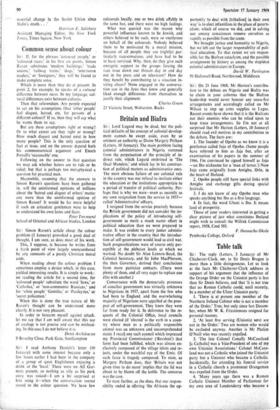Common sense about colour
Sir: If, for the phrases 'coloured people,' or 'coloured races,' in his first six points, Simon Raven substitutes 'modern buildings.' trade unions,' railway trains,' dogs,"SPEcra-roa readers,' or 'foreigners,' they will be found to make complete sense.
Which is more than they do at present. In point 2, for example, he speaks of a cultural difference between races. In my language, cul- tural differences exist between cultures.
Then that referendum. Are people expected to act on his assumptions (that 'other people' feel disgust, hatred, etc, for persons of a different colour)? If so, then they will say what he wants them to say.
But are these assumptions right or wrong?. Or to what extent are they right or wrong? How much disgust and hatred exist in how many people? This is the only question of fact at issue, and on the answer depend both his commonsensical argument and Enoch Powell's 'reasonable' one.
Following on the answer to that question we may ask whether haters are to rule or be ruled; but that is perhaps too metaphysical a question for practical men.
Meanwhile, assuming that the answers to Simon Raven's questions have been gathered in, will the uninformed opinions of millions about the 'hatred and disgust of others' matter any more than the uninformed opinion of Simon Raven? It would be far more helpful if such an articulate gentleman were to help us understand his own hates and fears.
Peter Townsend School of Oriental and African Studies, London


































 Previous page
Previous page